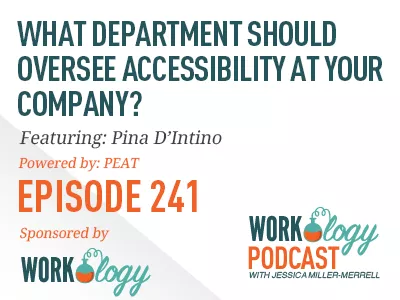How does accessibility work and who should be overseeing decisions, recommendations, and managing requests? These are important questions we should really be thinking about now especially with so many of us working virtual and remote. While remote work makes it easier for people with disabilities to have work because that work can now be at home. It does, however, make accessibility and accommodation requests different because we are working online and digitally.
Episode 241: What Department Should Oversee Accessibility at Your Company? with Pina D’Intino
(@pdintino)
This episode of the Workology Podcast is part of our Future of Work series powered by PEAT, the Partnership on Employment & Accessible Technology. In honor of the 30th anniversary of the Americans with Disabilities Act this July, we’re investigating what the next 30 years will look like for people with disabilities at work, and the potential of emerging technologies to make workplaces more inclusive and accessible. I’m joined by Pina D’Intino. Pina is a sought-after consultant , entrepreneur and speaker who actively promotes accessibility and inclusion from both executive-level and grassroots perspectives by bridging the viewpoints and needs of the organization, employees, and customers to establish best-practices environments.
As the owner of Aequum Global Access Inc, her team of accessibility experts help businesses and organizations develop their accessibility strategies and plans, measure and report on compliance and provide guidance for remediation. Aequum Global Access also provides accommodation services, training and project management services.
She is currently working with the Government of Canada, helping departments develop their roadmaps, provide consultation and technical support. In 2013, Pina received the QE2 Diamond Jubilee medal by Canada’s Lt. Governor the Honourable David Onley for her work in accessibility in employment.
Should HR Be in Charge of Accessibility and Accommodation Requests
Our work responsibilities as HR leaders are vast, and this often includes fielding workplace accessibility and accommodation requests. Since Pina is really an expert in this area, I thought it best to inquire about who should be fielding these type of requests. More and more companies have accessibility teams and/or Chief Accessibility Officers. We’ve seen this at companies like Accenture and IBM, but I wondered if it’s a trend she is seeing herself more and more. While these types of roles are becoming more common, Pina is seeing HR remain the central point of accessibility requests. She shares some of her experiences when it comes to technology accessibility and the increased involvement for involving a company’s IT department. Pina says as more companies are remaining virtual, IT and HR will need to work together moving forward. She says that remote work options offer employees more flexibility and accessibility than ever before.
Pina and I talk not just about accessibility requests from employees but also job seekers who need accommodation as part of the hiring and selection process. She shares her own personal experiences including how she has had conversations with employers in the past. These types of conversations are important for employers to hear because quite often we don’t receive requests because candidates don’t feel comfortable, out of fear, or because it is not clear how to request an accommodation especially if your hiring process doesn’t make it easy for candidates to interface with HR or a hiring manager directly. Think of all the automation we use in recruiting especially with email. When most candidates apply for a job, there is no direct path to contact someone in HR or recruiting to even request an accommodation. Even our confirmation email to candidates is an example of this. It reminds the job seeker that this email is unmonitored and unmonitored so don’t bother asking a question or requesting an accommodation.
Conclusion
I loved having Pina as a guest. She is an expert and also someone who is willing to talk to us candidly about her experience requesting accommodations and accessibility. This is important for us as HR leaders to hear. I want HR leaders to think about the process for accessibility requests, be open, and available to learn more about the different technology, tools, and resources that are available to us and our employees to help them be their best selves and do their best work.
The future of work series in partnership with PEAT is one of my favorites. Thank you to PEAT as well as our podcast sponsor Workology.
Connect with Pina D’Intino
RECOMMENDED RESOURCES
- Staff Training Resources from PEAT
- Ep 136: Future of Work: Workplace Accessibility
- Ep 234: Understanding Workplace Accessibility Testing
- Podcast Transcript
How to Subscribe to the Workology Podcast
Stitcher | PocketCast | iTunes | Podcast RSS | Google Play | YouTube | TuneIn
Find out how to be a guest on the Workology Podcast.








